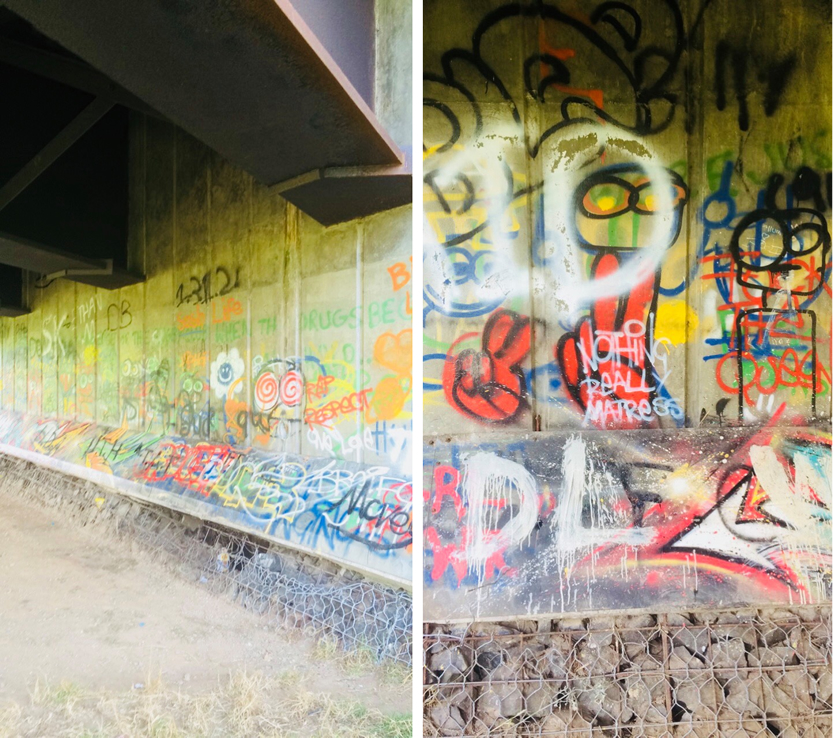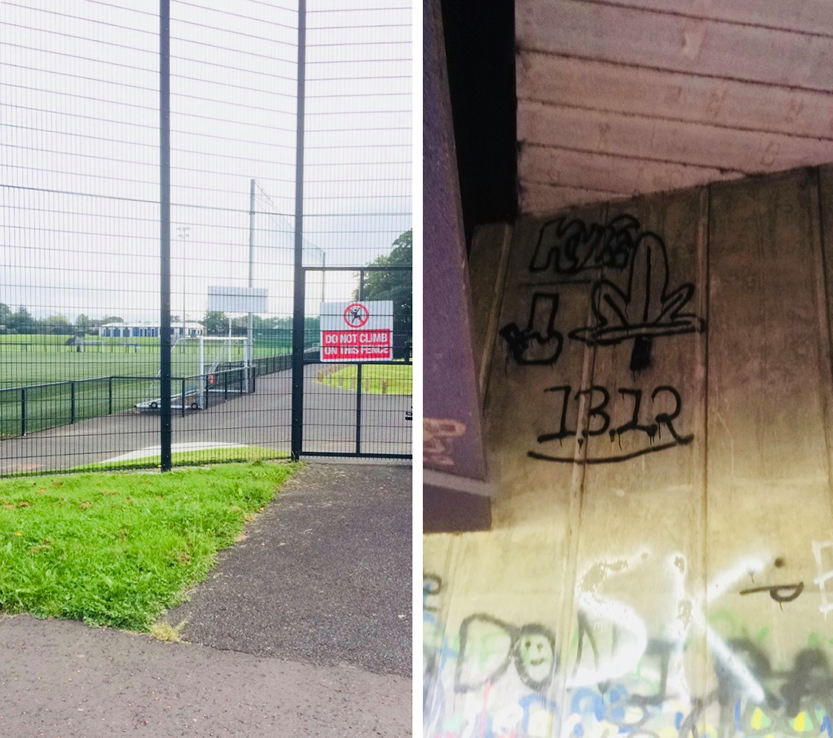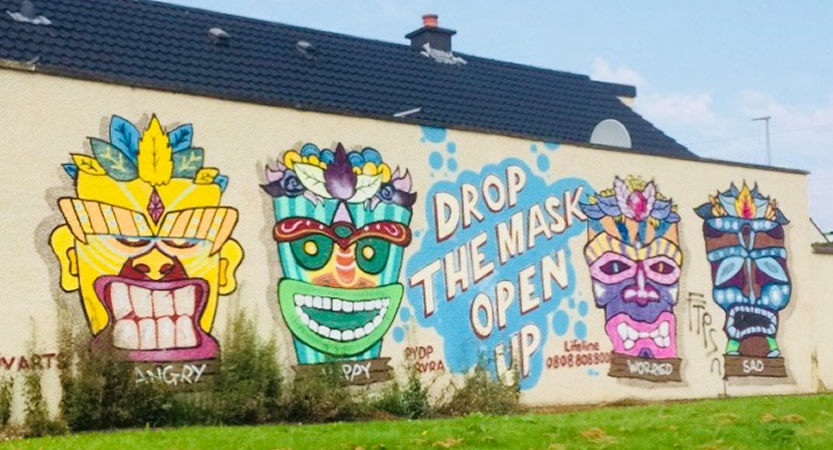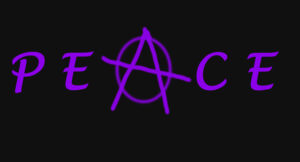This muse has been produced jointly with my blog manager who has supplied the inspiration and memories for the piece, as well as carrying out all the research. He wrote it in fact. I just gave it a bit of a final polish to make it shiny. I’m just a little Magpie, really.
One morning, very recently, I decided to deviate from the more familiar of my footfalls. I retraced the steps I’d taken many years ago, through places I used to play. It was a bit fanciful. A bit sad too. You never really forget. Running through my head was the Lennon/McCartney classic, ‘In My Life’:
There are places I’ll remember
All my life though some have changed
Some forever not for better
Some have gone and some remain.
Life, history and places move on. Nothing stands still. All we can hope is that the temporal progression of humanity brings ever greater rewards to the earth and its creatures. But it’s not really going that way so far. Changes for the better will surely come. Won’t they?
Everyone seems a bit more nostalgic than usual these days. We are all doing a bit of musing. I guess that could be a sign of the uncertain times we are living through. We are at the mercy of a microscopic life form against which we have little defence. An unseen enemy. And it’s coming for someone near you soon. I found myself musing recently, too, over the halcyon days of my youth; days on which the sun set many years ago. I found myself reminiscing about old friends, reliving the music, reacquainting myself with the emotions of being a teenager, as those of a certain age tend to do. Whilst deep in the midst of this happy yet melancholy meditation, two items in the news caught my attention. George Floyd and UB40.
Immediately following the death of George Floyd at the hands of the Minneapolis Police, waves of protest against systemic racism swept around the world, echoing with particular resonance in the US and UK. The desire for justice and the fight against injustice seems alive and well, if not exactly virulent. You may wonder how the British pop band UB40 fits into this maelstrom of protest, counter protest and violence? Duncan Campbell – who replaced his brother Ali as lead singer in 2008 following a split in the band – recently suffered a stroke. The story was widely covered in much of the main stream news. The BBC reported that he was thankfully recovering, and that UB40 were a band who were known for producing such hits as “Red Red Wine, Falling In Love With You and their cover of I Got You Babe featuring Chrissie Hynde.” Although I took umbrage with their report for a few reasons, I immediately saw a connection between UB40, George Floyd and the growing protests against racism. It is wonderful how an abundance of nostalgia can exercise your mental faculties making you see connections you may have missed on a less reflective day.
UB40 did indeed have a hit with a cover version of ‘I got You Babe’. ‘Red Red Wine’ and ‘(Can’t Help) Falling In Love With You’ were also cover versions. The band were, however, known for so much more than covers of classic pop songs and the BBC failed to acknowledge this. What I, and no doubt many others who lived through those heady days of the 2-Tone revolution of the late 1970s and early 1980s remembered most about UB40, was how they and the young soul rebels, Dexy’s Midnight Runners, complemented this second wave of Ska music. UB40, for me, were a better band with their first three albums of self-penned material; songs that were socially and politically conscious of the prevalent cultural climate. Those who lived through those days will recall the recession (yes, another one), riots, racial tensions, violence, soaring unemployment, and the Thatcher-led Tory Government’s war on the unions. Working class kids inevitably turned to music to soothe their growing pains, to find respite from the mad, mad world they had no hand in creating and to find the social and political education not provided in any classroom.
UB40 released their first single, a double A-side, in early 1980 on independent label Graduate Records. This subsequently became the first single to reach the UK top 10 without the backing of a major record label, a distinctive and ground-breaking journey for a record that critiqued just some of the many flaws of the established order. One side, ‘King’, was a lament about civil rights leader Martin Luther King which bemoaned the lack of direction in the movement after his assassination. The flip side, which received the majority of airplay, was the stirring ‘Food for Thought’; a song about the hypocrisy of a western religion that praises the Lord while tucking into an over-indulgent Christmas feast at a time when famines raged in Africa and people died of starvation as politicians in the UK sat idly by (yes, again). Fast forward four years, and Bob Geldof and Midge Ure would again highlight the plight of the starving millions and force politicians to act with the release of Band Aid’s ‘Do They Know It’s Christmas?’. And yet still we feast and fail to grasp that we’re all connected and that butterflies can cause untold destruction with a cursory flap of their perfect wings.
While UB40 dealt with many social and political themes in their early albums, the song I remember most from those days is ‘Tyler’; a stirring protest against the 1975 arrest and conviction of 17 year old Gary Tyler for murder:
Tyler is guilty the white judge has said so
What right do we have to say it’s not so
And so goes the chorus as the song laments the “racist jury … [the] false accusations … [that he’s] framed up for murder”. The song brought details of the abhorrent crime to the attention of the youth of the day and hoped to instil in them a lasting desire to see justice delivered and a deep distrust of institutions built upon the deviancy of the widely accepted moral authority. The young, teenage black boy was convicted of murder and given the death penalty, later commuted to life in prison. Gary Tyler served 41 years in prison despite all the evidence showing he was not guilty, only being released in 2016 after accepting a rough justice deal to plead guilty to manslaughter instead. Behind the song was a story grossly offensive to those with moral decency.
The Destrehan High School in Louisiana was forced into desegregation by court order in 1968. The local white community refused to accept this and, by 1974, were still protesting against the teaching of black and white kids together. In 1980, after being educated by the rather more socio-political messages of UB40 than the BBC lauded them for in 2020, I was horrified to find that into the mid-1970s many areas of the United States still wanted to persist with the racial segregation of schools. In October 1974, Gary Tyler was just 16. Destrehan High had closed early due to the racial tensions caused by the white community’s refusal to accept inter-racial education. The school bus taking the black kids home was attacked and surrounded by a mob of between 100-200 white people, some armed with assortments of weapons. The white mob attacked the bus and a shot rang out. 13 year old Timothy Weber was shot and fatally wounded while standing in the mob outside the bus. When the police arrived, they displayed open hostility towards the black kids. Gary Tyler’s cousin was wearing a necklace with a bullet and, even though the necklace obviously had nothing to do with the shooting, the police zoned in on this. Tyler spoke back to them and was subsequently arrested. All the black kids were taken to the police station where Tyler was systematically and badly beaten for what they perceived as impertinence. Other kids were pressurised into naming Tyler as the shooter. Larry Dabney, who was sitting next to Tyler on the bus, said:
“They didn’t even ask me what I saw. They told me flat out that I was going to be their witness. They started telling me what my statement was going to be. They told me I was going to testify that I saw Gary with a gun right after I heard the shot, and that a few minutes later hide it in a slit in the seat. That was not true. I didn’t see Gary or anybody else in that bus with a gun.”
It is clear that the police wanted to blame a 16 year old kid for the shooting for the simple reason he stood up to them and spoke back. Perhaps they thought “that son of a bitch [was] brave, and getting braver” (Bob Dylan, ‘The Hurricane’). The bus driver, a combat veteran, insisted the shot did not come from inside the bus. The police searched the bus thoroughly for 3 hours after the shooting, then searched again and still found no weapon. On a later third search, a weapon was ‘discovered’ on the bus, despite the interior having previously been ripped to pieces and nothing being found. The weapon turned out to have been a government issue Colt; one that had previously gone missing from a shooting range used by the sheriff and his deputies.

Gary Tyler went to trial with an incompetent lawyer for his defence; a lawyer who screwed up badly for Tyler, but possibly produced the result the white community wanted to see. He faced a white judge and a jury of his ‘peers’, which just so happened to be 12 white people in a state where 33% were black. As the trial proceeded, there was a mix of threatened and coerced witnesses and a sham of forensic evidence that could not verified independently due to the obstructive behaviour of the Head of Forensics who would later be discredited.
“Tyler is guilty the white judge has said so”, sang UB40.
Over the following years all the witnesses recanted their statements claiming they were forced. The case was taken up by activists and investigated by journalists who came to the conclusion that Tyler was just a black kid, wrong time, wrong place, and was locked away because of it. Amnesty International stated:
“Amnesty International believes that Gary Tyler was denied a fair trial and that racial prejudice played a major part in his prosecution.”
The U.S. Court of Appeals stated that the trial was:
“fundamentally unfair.”
Tyler was never given a retrial though. And, despite all the pressure that the evidence against him was fabricated, no one would ever step up to try to rectify such a horrendous wrong. Pardon Boards’ recommendations to free Tyler were ignored by Governors. A Democrat Governor refused to free him because it might lose him the white vote. Everyone knew that Tyler was an innocent victim of racism. The state of Louisiana eventually offered him a deal where he would be freed if he admitted his guilt. He refused. Gary Tyler would remain in prison for 41 years, until 2016, when he finally accepted a deal to admit to manslaughter in exchange for his freedom.
If that does not sicken you then I really doubt if anything ever will. An innocent man framed by a racist police force, with overwhelming evidence in his favour, and yet the system kept him imprisoned for a small lifetime. It is clear that systemic racism was alive and well for the four decades Gary Tyler spent in prison. Instead of anyone making the decision to release him, politicians gambled an innocent man’s life away to benefit their political careers. Gary Tyler remained incarcerated so they did not lose votes. And UB40 eventually subjugated their spirit of protest in favour of something more main stream. The BBC would acknowledge that some 40 years later. A similar length of time that Gary Tyler spent as an unfree man.
Time stands still in many ways and marches on defiantly and destructively in others. Some things change forever, some not for better, and some remain. So it seems that for graduates from the 1980’s school of 2-Tone and Rock against Racism, while they have become older and creak rather than skank, where it really matters nothing has really changed and that’s not a good thing. Racial hatred is still deeply entrenched in the economic, legal, political, and cultural institutions of modern society. The death of George Floyd is evidence of that. The response of many to the Black Lives Matter protests shows racism is alive and well in today’s society. If, like me, you have friends, or rather acquaintances, on Facebook whose response to BLM was to ask, “Why? Do white lives not matter too?”, then you have racist friends. They do not get the point. They just cannot bring themselves to say the decent thing – that this was wrong, that this was blatant racism. Instead they look for excuses, for some way to justify injustice. Yes, sometimes society isn’t great whether you are black or white, but the scales of inequality are definitely skewed against non-whites.

I have seen posts on my social media accounts shared by those who vehemently oppose taking a knee and reject BLM. They posted details of crimes committed by individuals. Black people. Sickening crimes at times. As if any of these somehow justify the death of Floyd; as if the crimes of these individuals justify racism; as if this negates the systemic racism and continued social slavery endured by a whole ethnic group. The people sharing these are in denial. They are possibly blind and/or deadened towards injustice. They are in denial of the legitimacy of the protests which are taking place. They are sharing memes cranked out by far right Nazi and racist social media groups, rather than just making the simple and accurate statement that ‘this was wrong’. It was wrong, is wrong and has been wrong for so long. It is a black and white issue. In this instance there are no grey areas. Just ask Gary Tyler.
For me, the music of UB40 was and always will be about so much more than the pop cover songs they produced in their fourth album. It was all about the social and political protests in their early music which are still so relevant today. George Floyd is proof there is still much to protest, though he is not living proof. UB40 are still fine artists to listen to in this era as racism, famine and all manner of injustices continue to reign unchecked by our political classes. I really hope today’s teenagers, when they get to their time of nostalgic reflection, will have more satisfaction when they look back over 40 years of their lives. I hope they will have achieved more success in changing society and politics than my generation did. Because we have failed. All around me people are brainwashed. ‘The best lack all conviction while the worst are full of passionate intensity’ as W B Yeats described it in ‘The Second Coming’.
I’m not sure I hold out much hope for the youth of today. As I walked through the places of my own youth I only saw evidence of exclusion. Places where we could escape the drudgery of poverty for a few hours and ‘hang out’ are now fenced off with 20 foot high fences and locked gates with all manner of ‘keep out’ signs. A professional mural depicting the ‘masks’ people wear which perhaps account for the soaring suicide rates in the young perhaps looks ‘tidier’ on a residential wall than graffiti, but does everything have to be so sanitised and organised these days? How can you be young against that background? A mad, mad world you had no hand in creating. I found what I thought was a small moment of respite when I walked under a bridge and found one of its pillars completely covered in chaotic graffiti. Some rather obvious cannabis leaves and bongs, but also a colourful display which promised much in the way of street art. On closer inspection I noticed ‘Fuck the Queen’. Not exactly punk, but maybe a hint of revolution? Nah, I don’t think so. I was excited by what at first I thought said ‘Nothing Really Matters’. Quoting Queen lyrics perhaps. A less anarchic bit of revolt, but a spirit of something a wee bit seditious maybe? On closer inspection I found it read ‘Nothing Really Matress [sic]’. Maybe it doesn’t. Maybe I have no sense of humour. Punk is dead. Long live the Queen.


